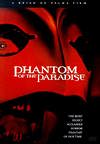Phantom Of The Paradise (1974)
20th Century Fox Home Entertainment
Cast: Paul Williams, William Finley, Jessica Harper
Extras: Bonus Trailers
Rating:
In 1974, director Brian DePalma brought forth a unique and biting satire of the day’s most celebrated entertainment vehicles: horror films and rock music. In "Phantom of the Paradise, " DePalma offered his twisted yet calculated vision of an industry gone mad, absorbed in greed and willing to make the ultimate sacrifice in exchange for worldly fame. Yes, it’s also that same quirky horror-musical that Wolfman Jack heralded nearly 30 years ago. Now, thanks to this wonderful DVD from 20th Century Fox, viewers have a renewed opportunity to discover the depth and daring of the director’s vision – qualities that enthusiasts have recognized and praised for decades now.
Originally conceived and written by DePalma in 1969, "Phantom of the Paradise" tells of naive composer Winslow Leach (William Finley) whose unfinished cantata, Faust, is stolen by music mogul Swan (Paul Williams) for purposes of opening his new rock palace, the Paradise. After failed attempts to confront Swan, Winslow is framed on drug charges and sent to Sing-Sing (where else?). Enduring dental experimentation and learning of Swan’s plans for Faust, Winslow escapes prison and seeks to destroy Swan’s record plant. Shot by a guard and disfigured after falling into a record press, Winslow emerges as the Phantom, intent upon exacting his revenge upon anyone who sings Faust – anyone except Phoenix (Jessica Harper), that is, who has captured Winslow’s heart.
Swan coerces the Phantom to sign a contract (in blood) and complete his cantata, having been promised that Phoenix will perform it – a promise quickly broken when Swan unveils the glitter-glam Beef (Gerrit Graham) as the star of Faust. Enraged, Winslow halts Beef’s premiere performance in electrifying fashion, allowing Phoenix the spotlight and propelling her to overnight stardom. Swan decides to marry his new star in a live telecast of the Faust conclusion. Meanwhile, Winslow uncovers the dark secret of Swan’s perpetual youth, his unrivaled success, and his dreadful plans for Phoenix.
"Phantom of the Paradise" is a compelling adaptation of Gaston Leroux’s "Phantom of the Opera," the legend of Faust, and Oscar Wilde’s "The Picture of Dorian Gray," all set against a vibrant neon-charged, drug-induced backdrop of an excessive entertainment industry. Though comically satirical at its core (sometimes scathingly so), DePalma skillfully weaves in clever genre references to films like "Psycho," "The Cabinet of Dr. Caligari," and the non-horror "Touch of Evil." Of course, there is also the Academy Award nominated score that features a host of musical numbers (written by Paul Williams) that work naturally within the story without artificially slowing its pace. The pace itself is frenzied, making excellent use of time compression technique, split-screen photography, and artful camera movement. It’s classic DePalma and marks the emergence of his undeniable visual artistry.
Largely misunderstood by 20th Century Fox (who would inexplicably anoint "The Rocky Horror Picture Show" a year later), "Phantom of the Paradise" was improperly pitched to the concert-going crowd, ignoring its substantial horrific, comic, and tragic qualities. Indeed, the film was something of an enigma to industry execs, thereby deepening the relevance of the film’s inherent satirical style. Critics were frustrated by its often schizophrenic flow and deemed it a disaster. Stateside, it performed poorly under its initial release campaign (though successfully re-released in 1976 as a ‘Horror-Phantasy’) while the European market immediately embraced it. Since then, it has become a cult favorite and enjoys a worldwide following that celebrates its stylish delivery, frenetic pace, and visual mastery.
Hats off, now, to 20th Century Fox Home Entertainment for presenting this cult classic in a stunning <$16x9,anamorphic> <$PS,widescreen> transfer that preserves its original 1.85:1 aspect ratio. The source print is the best I’ve seen in decades (and I’ve seen quite a few). Amazingly free of dust and damage, it serves as the perfect base for this beautiful transfer. The colors are energetic and fleshtones are rendered naturally even amid all the neon glow. The black levels are dark and solid, giving the film deep shadows, excellent contrast and crisp details. The few instances of grain are hardly worth mentioning and the compression exhibits no noticeable defects.
The audio here is less than an enthusiast would wish for but definitely a vast upgrade from previous incarnations that had been horribly mastered on video and laserdisc. Presented here in an original Dolby Stereo mix, it’s an active presentation that achieves a decent fullness although it lacks the ambient qualities and low-end presence that a 5.1 track could deliver. Still, Fox finally offers a truer mix that will appeal to purists and which restores much of the obscured dialog and score that was buried in the amateurish effort of past releases (with my personal thanks for the recovery of the emotive piano cue at the film’s climax). A nicely mixed French Mono track can also be found on the disc.
The extras are somewhat befuddling here, with what’s billed as the theatrical trailer being nothing more than full-frame scenes lifted from the film. Being familiar with the original first-run and re-release trailers, this choppy montage is something of an insult as it’s obviously not any sort of original trailer. A letdown, to be sure, though just barely excusable in light of the feature’s accurate presentation.
"Phantom of the Paradise" is a film that captivated me in my adolescent years and continues to deliver a powerful impact to this day. Though rated PG, its reflects its Seventies sensibilities in the liberal display of drugs and sexuality that would likely render it inappropriate for today’s pre-teen crowd. Regardless, it’s an incredibly compelling film that dazzles the eye and entertains thoroughly through its clever script and equally clever songs. This film is a trip – no doubt about it – and one definitely not to be missed.







